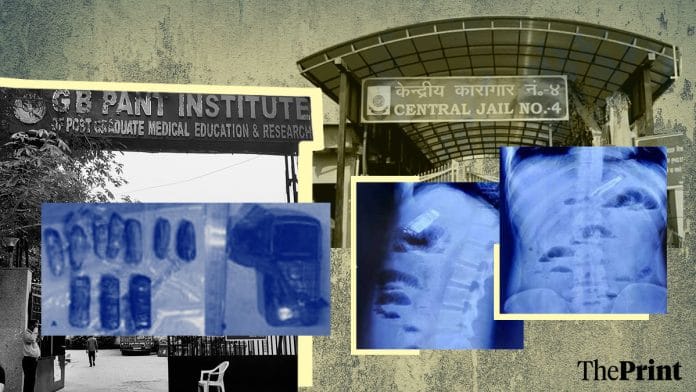New Delhi: Dr Ashok Dalal, a gastroenterologist at Delhi’s GB Pant Hospital, intently watches a screen as he guides an endoscopic camera through a patient’s oesophagus, or food pipe. As he pushes the tube, it hits a capsule-like object the size of a ping-pong ball. Further down, the camera beeps for another capsule and then another. On any other day, this would be an emergency, but today is different. The patient is a prisoner from Tihar Jail and Dr Dalal knows exactly what the capsules contain—tiny mobile phones.
Dr Dalal, 43, has a nickname among his colleagues: the Tihar specialist. He and his team have become the go-to experts for extracting illicit goods from the Tihar inmates’ bodies. What comes out no longer surprises them—mostly mobile phones, chargers, drug packets, knives, and blades, all valuable inside prison cells.
No other hospital deals with body-packing cases on such a large scale. While smugglers caught body-packing from airports and other places are sent to AIIMS, Safdarjung Hospital, and other medical institutions, GB Pant handles all the Tihar Jail cases. Since 2017, they’ve removed over 150 items lodged inside the bodies of more than 25 prisoners.
Their work is not just a lesson on how desperate and creative prisoners can get for contraband. It’s about health risks and serious challenges for prison security. There’s been an uptick in cases of late, but prison officials say that’s because of better detection protocols, including more checks and a stronger internal network of informants.
“We get such cases every two to three months. I can do this in my sleep now,” said Dr Dalal, briskly walking out after fishing out three mobile phones through an endoscopic procedure.
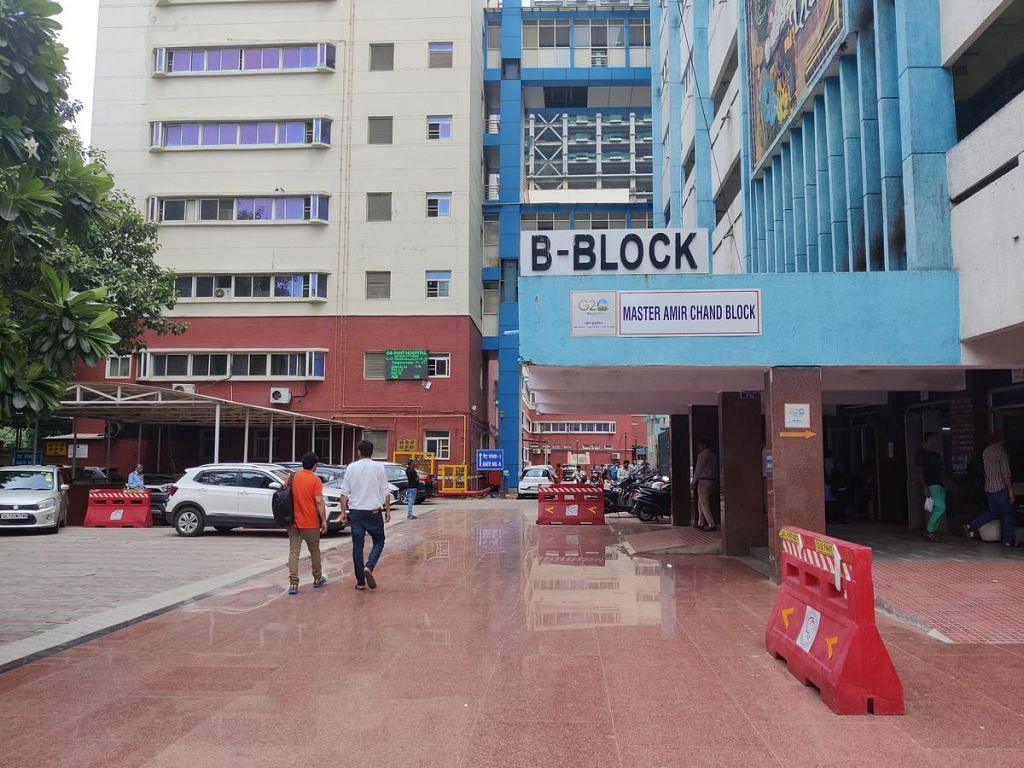
Dalal has gained such proficiency that it now takes him only 10 minutes to investigate and recover objects endoscopically.
He has also published two research papers in the Journal of Digestive Endoscopy, detailing how prisoners ingest objects and the best medical interventions in such cases. No other doctor in Delhi is as much of an expert in navigating the contraband-laden labyrinth of a patient’s digestive tract.
Tihar officials and doctors say that the nexus of body packers in prisons has increased over the last few years. These contraband mules, mostly men, are paid hefty amounts to act as “human couriers.” Many get arrested on purpose just to deliver valuable items inside the prison. Those that end up in emergency rooms represent just a fraction of the actual scale of such operations. Only the unlucky few who can’t naturally release their goods require medical attention. In some cases, packets remain lodged inside their bodies for years.
In regular people, (sphincter) muscles restrict and regulate the passage of food, urine, bile etc. But in professional body packers, the muscle loosens because of swallowing large objects. This makes it easy to ingest and pass out large objects.
-Doctor at GB Pant Hospital’s gastroenterology dept
The items are carefully wrapped in multiple layers of condoms, plastic sheets, ink, and tape, transforming into compact capsules that are easy to swallow. The condom acts as a lubricant, and the ink warns if the packaging might have ruptured. Inky stool or urine signals that it’s time to seek medical help.
But though the process requires some careful planning, the risks overall are low.
“Once loaded with the delivery, they commit some petty crime and get arrested. They then either vomit out these phones and drug packets or pass it through stool,” Dr Dalal said.
Professionals swear by different techniques. Some prefer lacing the packets with coconut oil and swallowing them as is, while others sandwich the packets between rice, bread, or pav to ease the process.
Low-risk, high reward
For many months, 28-year-old inmate Raman Saini functioned as a high-security human vault for mobile phones. Then, trouble came calling in August 2022. He couldn’t expel four of the six mobile phones he had swallowed for safekeeping.
Saini, a petty thief who had been in and of prisons, had six one-inch-wide Kechaoda mobile phones—a smuggling favourite among prisoners for their small size—lodged in his lower oesophagus. While he managed to vomit out two phones, the remaining four were stuck.
“We took him to Deen Dayal Upadhyay Hospital on 29 August 2022. The doctors there could not remove the phones,” said a Tihar prison official on condition of anonymity. The doctors then referred Saini to GB Pant Hospital’s gastroenterology department.
I have removed objects that have been inside patients’ bodies for four to five years. Sometimes, they even forget that they have swallowed these things
-Dr Ashok Dalal
“Two phones were immediately removed, but two remained stuck and required surgical intervention,” the prison official added.
Curiously, Saini had been carrying these phones for nearly a year. Some prison officials even recall the metal detector going off each time Saini was patted down. But it wasn’t until he confessed that the mystery of the pinging machines was solved.
Saini’s wife, 23-year-old Pooja, confirmed his access to a mobile phone in prison. Their love story started in 2015, shortly after Pooja walked out of her first marriage and was introduced to Saini through a mutual friend.
For the next eight months, they spoke for hours over the phone every day but didn’t meet during that period. The reason for this distance was that Saini was in jail, serving time for a robbery.
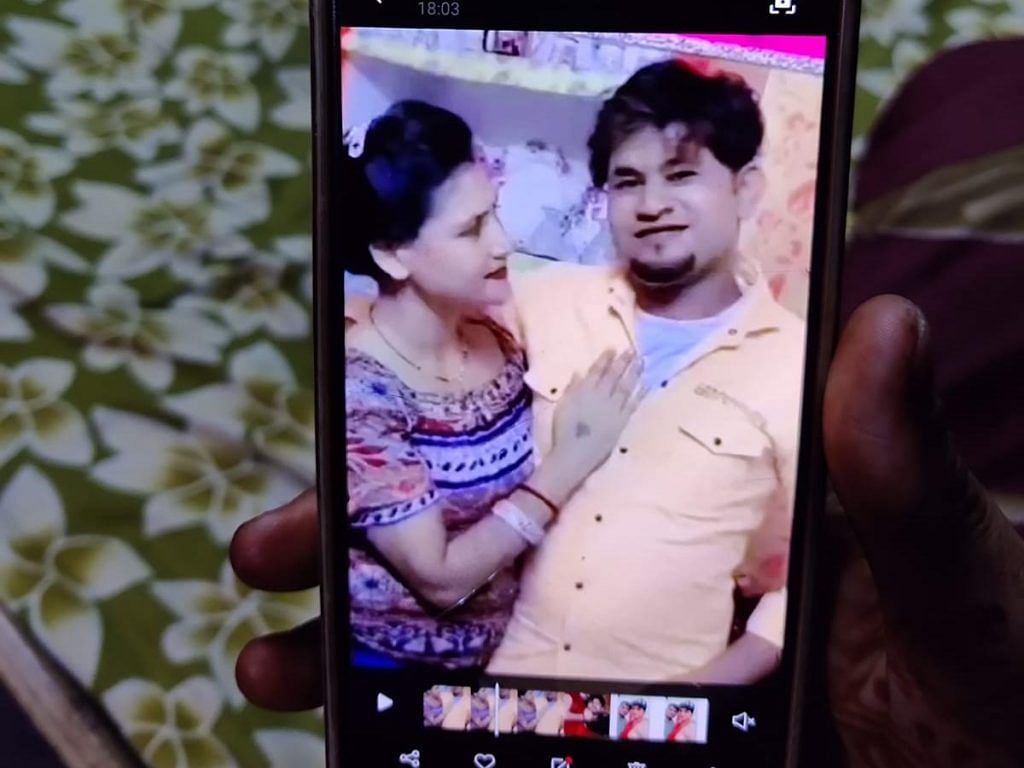
“I did not know he was in jail at the time, but we used to talk on the phone daily,” Pooja told ThePrint. Saini is still in prison.
Another prisoner, 22-year-old Sahil, was admitted in October 2023 after complaining of abdominal pain and confessing that he had a phone stuck in his stomach. But the doctors found something else too—drug packets that hadn’t been caught by X-ray machines. It was only after a CT scan that doctors confirmed the presence of drug packets.
While such hairy situations do occasionally arise, Dr Dalal said that body-packing remains popular due to its “low-risk and high reward” nature. The objects these prisoners ingest can remain in their bodies for years without causing health issues or long-term damage.
In the worst cases, drug packets could burst, causing an overdose and mobile phones could corrode from stomach acids, but such cases are rare, according to Dr Dalal.
“In most cases, they get by with no real damage. Endoscopy itself is a non-invasive procedure where you do not even have to stay in the hospital for a day,” he said. “So, the rewards far exceed the possible risks.”
Last year, prison officials seized 1,100 mobiles from inmates, along with other contraband and knives.
‘Professional’ bodypackers
A young doctor, surrounded by a pile of case files, holds up two CT scans. One is a scan of a regular patient, and the other of a prisoner who was admitted at GB Pant Hospital a month ago. The differences are subtle, but obvious to the trained eyes at the gastroenterology department.
“These are the sphincter muscles, which are present in various parts of our body,” the doctor said, pointing at the food pipe in the inmate’s scan. “In regular people, these muscles restrict and regulate the passage of food, urine, bile etc. But in professional body packers, the muscle loosens because of swallowing large objects. This makes it easy to ingest and pass out large objects.”
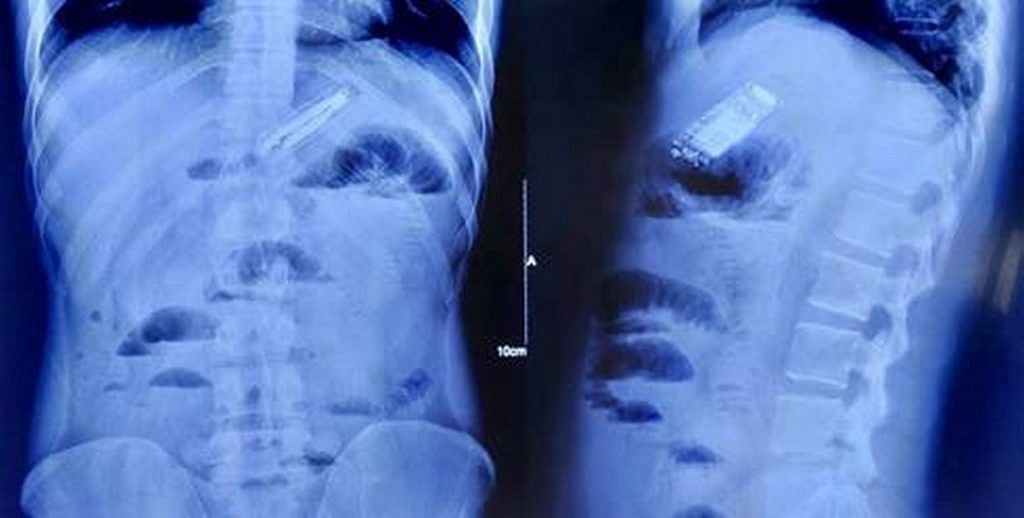
However, this “ease” requires smart planning and skilful packing.
Former inmate Harsh Singh Mewati, now enrolled in the Delhi Police’s reformatory programme, described the intricate process of transforming various items into covert cargo. Whether it’s mobile phones, drug packets, gold, cash, or small weapons, items must first be packed in layers of plastic, condoms, or rubber balloons. Success depends on size and smoothness. The package must be small and slippery enough to glide down the oesophagus easily and later be vomited out. But it also must be large enough to stay put in the body for longer.
A failure-check system is also important. After every few layers, drops of methylene blue—a blue dye—are applied.
“Methylene blue is your warning sign,” 45-year-old Mewati said. “If you start vomiting or urinating blue, it means that a few layers of the packaging have gotten damaged. Then, it is time to either force yourself to release the objects or alert the authorities.”
We have increased security inside the prison complex to catch any signs of such activities
-Tihar official
Once the package is ready, the “human couriers” prepare themselves. Professionals swear by different techniques. Some prefer lacing the packets with coconut oil and swallowing them as is, while others sandwich the packets between rice, bread, or pav to ease the process.
After reaching the prison, most seasoned body packers know when and how to release the packets. Vomiting provides better control over delivery but has a limited time window. Once the packets pass a certain level in the digestive process, the packers must wait for a less desirable expulsion method—through stools.
“These packages could stay there for weeks and even years. I have removed objects that have been inside patients’ bodies for four to five years. Sometimes, they even forget that they have swallowed these things,” Dr Dalal said.
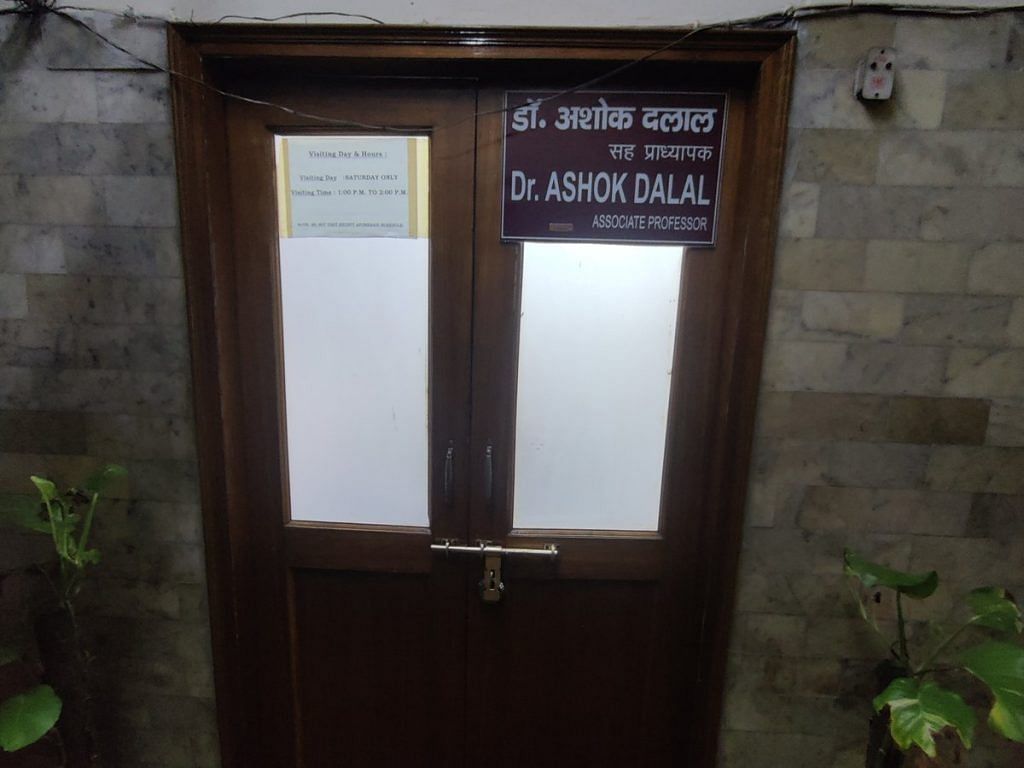
The risks and removal
Dr Dalal’s transition from a conventional gastroenterologist to a “Tihar specialist” was accidental rather than planned. He left his private practice to join GB Pant Hospital in 2016, encountering his first prisoner body-packing case a year later. After careful consideration, he opted for endoscopic removal instead of typical surgical methods.
Soon enough, he became a regular port of call for Tihar officials wanting a smooth solution to tricky ‘human courier’ cases. As Dalal’s expertise grew, he published his first research paper on the subject in the Journal of Digestive Endoscopy—a case study of a 35-year-old prisoner who had swallowed five drug packets and a mobile phone. The paper explored endoscopy as a technique for such removals.
If you start vomiting or urinating blue, it means that a few layers of the packaging have gotten damaged. Then, it is time to either force yourself to release the objects or alert the authorities
-Harsh Singh Mewati, former Tihar inmate
In 2021, he published another paper in the same journal with eight case studies of prisoners, where mobile phones, drug packets, surgical blades, and even a gold chain were retrieved.
Dalal is now considered a leading authority in this niche field and regularly presents his work at international conferences. While he avoided social media for much of his life, he has recently embraced X, connecting with colleagues who are dealing with similar cases worldwide. His phone is a repository of X-rays, scans, and pictures of slimy packets and phones extracted from patients. He’s a man of few words, but always up for a technical discussion.
According to Dalal, foreign bodies usually get stuck in three areas— the pylorus, which connects the stomach to the small intestine, the lower oesophagus, and the upper oesophagus. These, he said, are bends in the digestive system where larger packets tend to get jammed.
“If these trouble points are cleared, the capsules are easily passed,” he added.

Drug packets can also be a slippery slope for doctors. Unlike mobile phones or blades, they run the risk of bursting inside a patient’s system if pulled out endoscopically. In such cases, surgery is preferred.
“If we get any hint that the packet could be damaged, we suggest surgeries,” Dalal said.
Not all the prisoner-patients that Dalal sees are hardened criminals. He recounted a prisoner breaking out in tears after admitting to ingesting packets for the first time. In this case, Dalal opted to go for traditional surgery rather than endoscopy.
“I still remember he was a 19-year-old boy and was very anxious that the packets were stuck. With rookies, we do not take a chance,” he said.
Also Read: More Indians are seeking moksha through science. Medical colleges have surplus corpses now
The larger nexus
In Tihar, prison officers have been closely watching a prisoner who sets off the metal detectors every time he passes through security checks. Despite thorough searches, they’ve found nothing.
“He has been saying that he got metal rods in his legs after an accident, and the buzzing might be triggered by these implants,” a prison official said. But suspicion is always high about inmates with ‘stomachs of steel’.
Phones are a prized commodity at Tihar. Many gangsters use them to run operations from behind bars and the devices are exchanged at high commission rates. Drugs are in high demand too and sold for a premium. Dealers have a trusted market inside, sending their agents inside to distribute their goods. The smuggling of weapons is a worry as well, especially in the wake of high-profile incidents such as the Tihar murder of gangster Sunil Balyan alias Tillu Tajpuriya in 2023 and an attack with a makeshift knife on a member of rival Gogi gang in June this year.
Last year, prison officials seized 1,100 mobiles from inmates, along with other contraband and knives.
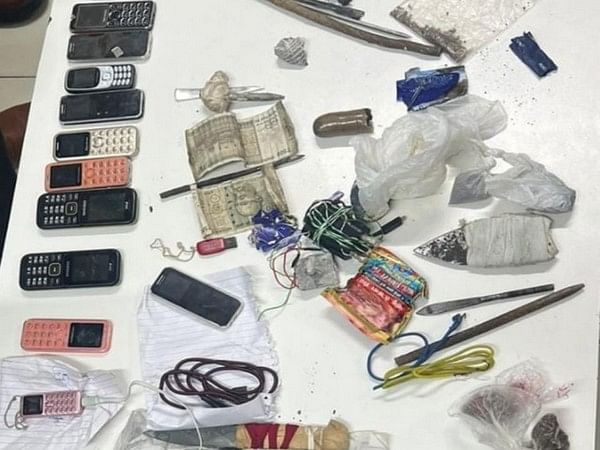
To tackle the issue, prison officials conduct surprise raids and are also hoping for advanced technology to detect bodypacking cases.
A senior Tihar official said that the prison had proposed installing a body scanner last year, but the Union home ministry put this proposal on hold for now after some human rights groups raised concerns about “privacy breach”.
“This is a sensitive matter. We have to consider many things. However, that is not to justify such activities. We have increased security inside the prison complex to catch any signs of such activities,” a Tihar spokesperson said.
So far, there are few deterrents for bodypacking. It’s easy to master and hard to detect. Even if items get stuck, it usually means just some hours at the hospital and a simple tube procedure. It’s possible to return to the cell the same day and go about business as usual.
Meanwhile, Dr Dalal and his team are arms deep in another case. This time the prisoner has gulped down two phones. Instead of using endoscopy, the doctors have administered laxatives and are waiting for the man to release his contraband naturally.
“He has been to the washroom around five times in the last three hours. We are waiting for the items to be retrieved. I am sure we will get a new case very soon,” Dr Dalal said wryly.
(Edited by Asavari Singh)



